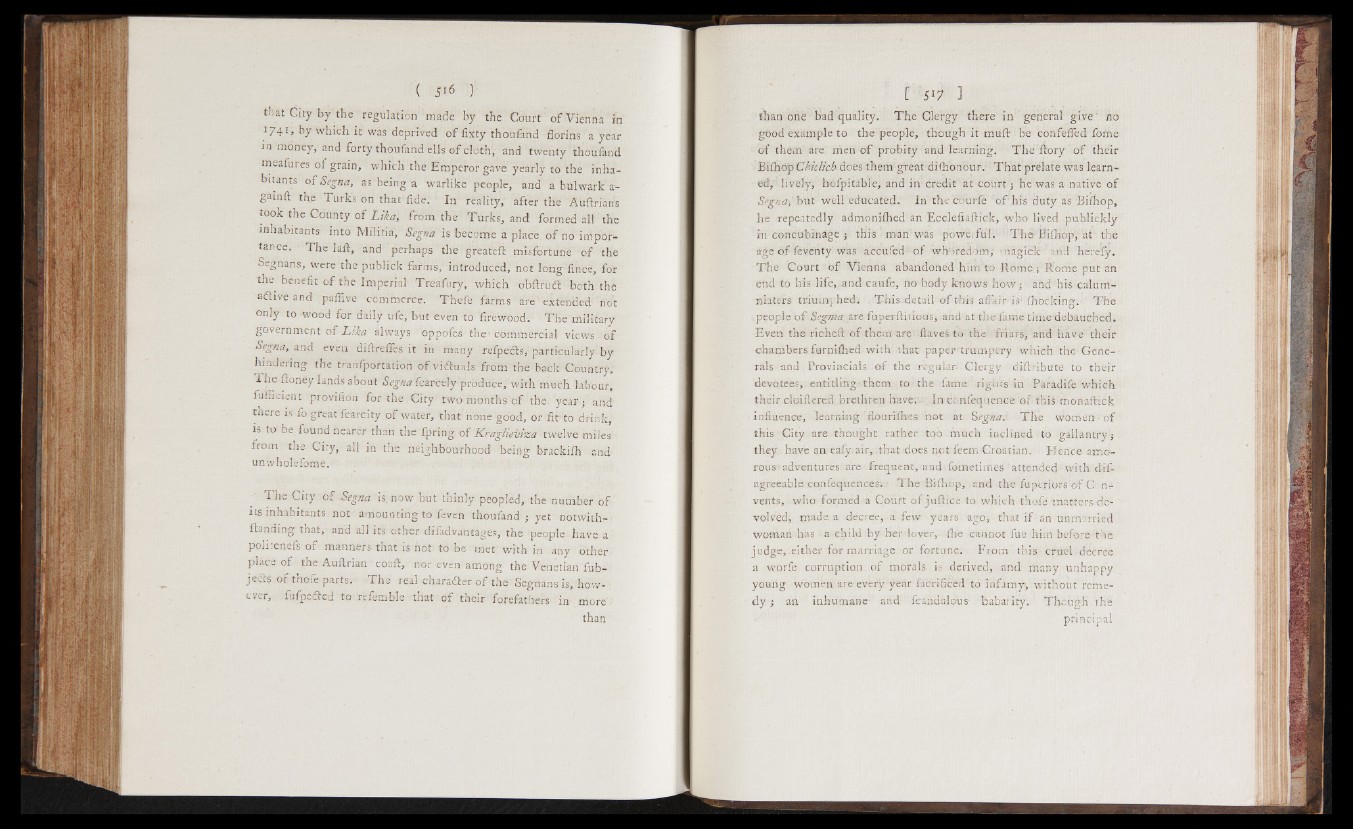
that City by the regulation made by the Court o f Vienna in
1741, by which it was deprived o f iixty thoufand florins a year
in money, and forty thoufand ells o f cloth, and twenty thoufand
meafures of grain, which the Emperor gave yearly to the inhabitants
o f Segna, as being a warlike people, and a bulwark a-
gainft the Turks on that fide. In reality, after the Auftrians
took the County o f Lika, from the Turks, and formed all the
inhabitants into Militia, Segna is become a place o f no importance.
The laft, and perhaps the greateft misfortune of the
Segnans, were the publick farms, introduced, not long fince, for
the benefit o f the Imperial Treafury, which obftrutft both the
a ¿five and pafiive commerce. Thefe farms are extended not
only to-wood for daily life, but even to firewood. The military
government o f Lika always oppofes the'commercial views of
Segna, and even diftreffes it in many refpeds, particularly by
hindering the tranfportation o f viduals from the back Country.
The ftoney lands about Segna fcarcely produce, with much labour,
fuificient proviiion for the City two months o f the. year; and
there is fo great fcarcity o f water, that none good, or fir to drink,
is to be found nearer than the ipring o f Kraglieviza twelve miies
from tne City, all in the neighbourhood being brackiih and
unwholefome.
The City o f Segna is. now but thinly peopled, the number of
its inhabitants not amounting to feven thoufand; yet notwith-
ftanding that, and all its: other difad vantages, the people have a
politenefs o f manners that is not to be met wi thin any other
place o f the Auilrian coaft, nor even among the Venetian fub-
jed s o f thoie parts. The real charader of the- Segnans is, however,
fufpeded to referable that o f their forefathers in more
than
than one bad quality. The Clergy there in general g iv e ' no
good example to the people, though it muft be confefled fome
of them are men o f probity and learning. The ftory o f their
Biftiop Chic lie b. does them great di (honour. That prelate was learned,
lively, hofpitable, and in credit at court; he was a native of
Segna-, but well educated, in the courfe of'his duty as Biftiop,
he repeatedly admoniihed an Ecclefiaftick, who lived publickly
in concubinage ; this man* was ' poweifiil. T h e BiftiopV at- the
age o f feventy* was accufed of whoredom, magicfc and herefy.
The Court o f Vienna abandoned him to Rome; Rome put an
end to his life, .and caufe, no body knows h ow ; and his calum-
niaters triumphed. This detail o f this affair is- (hocking.- The
people o f Segnia are fuperftitious, and at the fame time-debauched.
Even the richeft o f them are Haves to the friars; and have their
chambers furniihed with that paper trumpery which the Generals
and Provincials of the regular; Clergy diftribute to their
devotees,.entitling-them to the lame rights in Paradife which
their cloiftered brethren have.-- In confequence oi this monaftick
influence, learning flourifhes not at Segna.-. The women: of
this City are thought rather too much inclined to gallantry;,
they, have an eafy.air, that-does not feem Croatian. Hence amorous
¡adventures are frequent, and fometimes'attended with dif-
agreeable confequences. The Biftiop, and the fuperiors'of C¡ nr
vents, who formed a Court of juftice to which -thefe matters do- *
volved, made a decree, a few years -ago, that i f : an unmarried
woman has a child by her ¡lover, (he cannot fue him before the
judge, .either for marriage or fortune. From this cruel .decree
a worfe corruption of morals is derived, and many unhappy
young women are every year facrificed to infamy, without remedy
; an inhumane- and- fcandalous babaiity. Though the